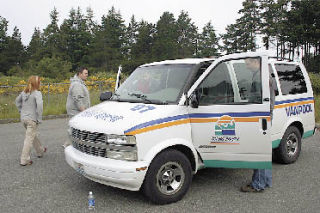Long commutes can wear on drivers when rising gas prices have only one wallet to sink their endlessly greedy claws into. But no one has to bear it alone. Vanpooling is gaining momentum as Whidbey Island residents search for cheaper and more enjoyable ways to commute.
Kris Lohmann considered riding a bus for his daily commute from Oak Harbor to his workplace, Regence BlueShield in Burlington.
“But I would sit on a bus for one to one and a half hours when the drive is 45 minutes,” Lohmann said.
An alternative for those who can’t easily commute by bus or who want a more tightly-knit group to ride with is vanpooling.
Vanpooling consists of five to 15 people commuting to work together in a van. Riders usually work the same hours and days.
The Island Transit Vanpool Program has 55 vans on the road now, according to Julie Lloyd, Island Transit Rideshare Coordinator. Four of those vans were just started in the last few weeks.
“There’s been a tremendous amount of interest. People call on a daily basis,” Lloyd said.
May 2008 numbers haven’t been compiled yet, but in April, 393 people were vanpooling through Island Transit’s program, according to Lloyd.
“It’s gone up considerably since then,” Lloyd said last week.
Julia Goodman is a driver for her vanpooling group from Oak Harbor to Burlington. She’s been vanpooling to work for over two years.
“I joined to save money and our company reimburses us for vanpooling. I was racking up lots of miles on my car,” said Goodman.
For his commute, Lohmann pays less than five dollars per month because his workplace reimburses employees for mass transit up to $80 a month. The program Lohmann’s workplace uses is called Commute Reimbursement Expense Account. Various workplaces have programs similar to this. Without this program, Lohmann would pay $80 to $85 a month to vanpool, which is still a 50 percent savings for him over driving his own car.
The benefits of vanpooling leave riders with nothing to lose but expensive, lonely drives.
“You save wear and tear on your personal vehicle,” Lloyd said. That means lower mileage and lower maintenance costs for the vehicle, and also lower insurance costs.
Also, there are ferry benefits. Vanpools go fare-free and only pay on the return trip. They get preferential loading, which saves on wait time for the ferry.
“Also, you can feel good about reducing your carbon footprint,” said Lloyd.
Steve Erickson of Whidbey Environmental Action Network said, “Vanpooling means fewer cars, which means less fossil fuels consumed and less carbon dioxide in the air. Every little bit helps.”
Lohmann and his co-workers at Regence are working to go green, and vanpooling is a meaningful way for him to support that goal.
“Instead of six cars, we have one van driving. We’re able to be a little greener,” Lohmann said.
Goodman doesn’t miss her isolated pre-vanpool commute.
“We have fun driving back and forth. We have a great group of people and it’s a time to socialize,” said Goodman.
While Lohmann enjoyed driving alone and listening to books on tape, vanpooling brought co-workers from various departments and points of view together.
“It’s really fun to get to know my co-workers. We have interesting conversations,” Lohmann said.
Lohmann said he had no problems joining a vanpool.
“It was easy to set it up. Island Transit made it easy to do the driver training,” Lohmann said.
Fare is divided among the group based on mileage per month, according to Lloyd. Island Transit doesn’t operate their vanpool program for profit.
Island Transit is charging her vanpool approximately 39 cents per mile, Goodman said.
To create a vanpool, two drivers, a manager, a bookkeeper, and a backup manager/bookkeeper are required. They pay reduced rates for fulfilling those duties. These positions must attend classes listed on Island Transit’s website.
To join an existing vanpool, self-ridematch at www.rideshareonline.com, or call the Rideshare Coordinator at 800-240-8747, 360-678-7771, or 360-321-6688. For more information on vanpooling or buses, visit www.islandtransit.org.



